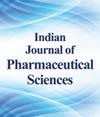The Impact of Early Goal-Directed Therapy in Conjunction with Glucocorticoids in the Prognosis of Septic Shock
IF 0.4
4区 医学
Q4 PHARMACOLOGY & PHARMACY
Indian Journal of Pharmaceutical Sciences
Pub Date : 2023-01-01
DOI:10.36468/pharmaceutical-sciences.spl.704
引用次数: 0
Abstract
Quan et al. : Impact of Early Goal-Directed Therapy in the Prognosis of Septic Shock To assess the efficacy of early goal-directed therapy in conjunction with glucocorticoids on the prognosis of septic shock is the objective of the study. 60 septic shock patients admitted to the hospital from June 2019 to August 2022 were split into control cohort and observation cohort according to the method of random number table, with 40 patients in every cohort. Both cohorts underwent standard therapy, with the observation cohort additionally receiving intravenous hydrocortisone drip and early goal-directed therapy, all of which were continuously treated for 7 d. The baseline data of all patients, such as sex, age, infection site, sequential organ failure assessment score and immune cell level, were recorded in detail, and the C-reactive protein, intensive care unit hospitalization time, and the duration of mechanical ventilation was observed for patients. The therapeutic impact of early goal-directed therapy combined with glucocorticoids on septic shock in the analysis period aims to inform the optimal therapy strategy selection. Following therapy, the cluster of differentiation 4 + , cluster of differentiation 8 + and cluster of differentiation 4 + /cluster of differentiation 8 + ratios in both the therapy and control cohorts increased significantly, exhibiting statistical significance. The therapy cohort demonstrated a notable decrease in C-reactive protein, intensive care unit hospitalization duration and mechanical ventilation time when compared to the control cohort, with the difference being statistically significant. Early goal-directed therapy combined with glucocorticoid can enhance the cellular immune function of patients with septic shock, reduce the systemic inflammatory reaction and improve the prognosis.早期目标导向治疗联合糖皮质激素对感染性休克预后的影响
本文章由计算机程序翻译,如有差异,请以英文原文为准。
求助全文
约1分钟内获得全文
求助全文
来源期刊

Indian Journal of Pharmaceutical Sciences
PHARMACOLOGY & PHARMACY-
自引率
0.00%
发文量
0
审稿时长
2 months
期刊介绍:
The Indian Journal of Pharmaceutical Sciences (IJPS) is a bi-monthly Journal, which publishes original research work that contributes significantly to further the scientific knowledge in Pharmaceutical Sciences (Pharmaceutical Technology, Pharmaceutics, Biopharmaceutics, Pharmacokinetics, Pharmaceutical/Medicinal Chemistry, Computational Chemistry and Molecular Drug Design, Pharmacognosy and Phytochemistry, Pharmacology and Therapeutics, Pharmaceutical Analysis, Pharmacy Practice, Clinical and Hospital Pharmacy, Pharmacovigilance, Pharmacoepidemiology, Pharmacoeconomics, Drug Information, Patient Counselling, Adverse Drug Reactions Monitoring, Medication Errors, Medication Optimization, Medication Therapy Management, Cell Biology, Genomics and Proteomics, Pharmacogenomics, Bioinformatics and Biotechnology of Pharmaceutical Interest). The Journal publishes original research work either as a Full Research Paper or as a Short Communication. Review Articles on current topics in Pharmaceutical Sciences are also considered for publication by the Journal.
 求助内容:
求助内容: 应助结果提醒方式:
应助结果提醒方式:


